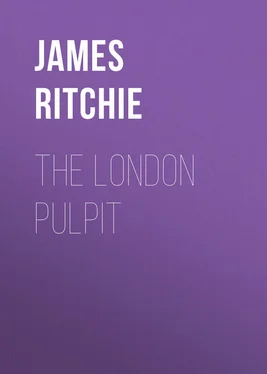James Ritchie - The London Pulpit
Здесь есть возможность читать онлайн «James Ritchie - The London Pulpit» — ознакомительный отрывок электронной книги совершенно бесплатно, а после прочтения отрывка купить полную версию. В некоторых случаях можно слушать аудио, скачать через торрент в формате fb2 и присутствует краткое содержание. Жанр: foreign_prose, на английском языке. Описание произведения, (предисловие) а так же отзывы посетителей доступны на портале библиотеки ЛибКат.
- Название:The London Pulpit
- Автор:
- Жанр:
- Год:неизвестен
- ISBN:нет данных
- Рейтинг книги:3 / 5. Голосов: 1
-
Избранное:Добавить в избранное
- Отзывы:
-
Ваша оценка:
- 60
- 1
- 2
- 3
- 4
- 5
The London Pulpit: краткое содержание, описание и аннотация
Предлагаем к чтению аннотацию, описание, краткое содержание или предисловие (зависит от того, что написал сам автор книги «The London Pulpit»). Если вы не нашли необходимую информацию о книге — напишите в комментариях, мы постараемся отыскать её.
The London Pulpit — читать онлайн ознакомительный отрывок
Ниже представлен текст книги, разбитый по страницам. Система сохранения места последней прочитанной страницы, позволяет с удобством читать онлайн бесплатно книгу «The London Pulpit», без необходимости каждый раз заново искать на чём Вы остановились. Поставьте закладку, и сможете в любой момент перейти на страницу, на которой закончили чтение.
Интервал:
Закладка:
But Mr. Bellew has other attractions. Not only are his sermons broad and catholic in tone, – not only are they enunciated with oratorical effect, – not only are they heightened by the charm of a commanding presence, – but they are in themselves highly polished, full of passages of rare eloquence, and retain the attention of the hearers. They all open well, the exordium is always spirited, and its tone is maintained to the end of the discourse. Thus one commences as follows, “Eternity is the answer to life’s question – immortality is the hallowed reward of life’s holy works.” Another has, “Life is the expression of religion.” In another we get a quotation from Tacitus pregnant with meaning, “Truth is established by investigation and delay.” Then the circumstances of the text are well brought out. If Paul speaks at Corinth, we see that licentious city with its groves and temples; if on Mars’ hill he proclaims an Unknown God, the orator, with a lustre on his face brighter than any genius could bestow, is in our midst; around him are the restless Athenians, and in the background, the marble statues of their deities – of silver-eyed Minerva, and Apollo, lord of the silver bow. If some divine word of the Great Teacher himself is the subject of discourse, then the Hebrew landscape is painted as only those can paint who have trod the steps – as Mr. Bellew has done – where, more than eighteen centuries ago, the Christ and his sorrowing disciples trod. Occasionally a little pompous verbosity may be detected; instead of simply telling us how the earth’s great ones are despised too often by the world, Mr. Bellew says, ‘My experience of life, and the more I read from all history, sacred and profane, modern and ancient, is this – the veritable heroes of humanity have generally been decorated with the epithets of popular insult.’ This is a little too much in the mouthing vein, and reminds us of the singular encomium on Mr. Bellew in the Morning Herald , to the effect that our preacher ‘unveils the plan of salvation in the most graceful and attractive manner’ – as if Mr. Bellew was a Madame Mantilini, and the plan of salvation was the last new fashion. Perhaps for this singular criticism Mr. Bellew is in some part accountable. Our readers may have seen a caricature of two popular preachers, under the title of Brimstone and Treacle. Brimstone is supposed to represent the youthful hero of the Surrey Music Hall: the pulpit Adonis, curled and scented and lack-a-daisical, called Treacle, is supposed, though very wrongly, for Mr. Bellew is no man-milliner, to typify the subject of this sketch. In spite of grey hair and sallow cheeks, Mr. Bellew has somewhat too much the appearance of a lady’s man, and his Christianity is evidently that which will do credit to the best society; nor is this to be wondered at. Has he not an uncle a Bishop, and has he not the élite of the beau-monde to hear him?
THE REV. THOMAS DALE, M.A
In the good old times, before the Reform Bill was carried and the Constitution destroyed, at a period long prior to the introduction of cheap ’busses and penny steamers and the new police, stood an old church in the north of London, in which the parishioners of St. Pancras were accustomed to meet for public worship. In spite of its unadorned appearance, it was a venerable pile. According to some, it was the last church in England where the bell tolled for mass, and in which any rites of the Roman Catholic religion were celebrated. In its burying-ground twenty generations now sleep the sleep of death. Grimaldi the clown, Woollet the engraver, William Godwin, Mary Wolstonecraft, Walker, immortalized by his Pronouncing Dictionary, Woodhead, the reputed author of the ‘Whole Duty of Man,’ Jeremy Collier, the writer against stage plays and the successful combatant of Dryden, Ned Ward, author of the ‘London Spy,’ Theobald, the hero of the early editions of the ‘Dunciad’ and the editor of ‘Shakspeare,’ Boswell’s friend, the Corsican Paoli, here await the resurrection morn. What passions, what hopes, what virtue and vice, what loved and loving forms, what withered anatomies, have here been laid down! Tread gently! – every bit of dust you tread on was once a man and a brother. Tread reverently! for here human hearts bursting with agony – the mother weeping for her children, the lover for his bride – have seen the last of all they hoped for under the sun. You may hear a good sermon here from the old text: ‘Vanity of vanities,’ saith the preacher, ‘all is vanity.’ Such is the lesson we learn here – that all the shows of the world are poor and little worth – that false is
‘ – the light on glory’s plume,
As fading hues of even.
And love, and hope, and beauty’s bloom,
Are blossoms gather’d for the tomb —
There’s nothing true but heaven!’
But we may not linger here. Time came and went, and, as usual, wrought wonders. St. Pancras ceased to be St. Pancras in the fields. It was laid out in broad streets and handsome squares. It was lit up with gas. It echoed to the roll of carriages. It witnessed the introduction of flunkies, with glaring livery and tremendous calf. Upon its broad pavements flaunted, in all their bravery, city lords and city ladies. Of course, the old church would not do for such as they. Early Christians might worship God in a barn, but modern ones, rich and respectable – of course, if they are rich they must be respectable – would not for the life of them do anything so ungenteel. So a new place – the first stone of which was laid by a Royal Duke, notorious for his debts and his connexion with Mrs. Clarke, – was built, with a pulpit made out of the old well-known Fairlop oak, on the model of a certain great heathen edifice, and the St. Pancras new church reared its would-be aristocratic head. Alas! alas! it was on the unfashionable side of Russell-square. That difficulty was insurmountable, and so the church has to stand where it does. However, the frequenters try to forget the unpleasant fact, and to make themselves as genteel as they can.
Take your stand there at eleven on the Sabbath morning. What a glare of silks and satins – of feathers – of jewels – of what cynics would call the pomps and vanities of the world! With what an air does that delicate young female – I beg her pardon, I mean young lady – foot it, with Jeames behind carrying her Book of Common Prayer! United Belgravia could hardly do the thing in better style. Enter the church, and you will see the same delightful air of fashionable repose. If the grace that is divine be as common there as the grace that is earthly, Mr. Dale’s charge must be a happy flock indeed. With what an air does it bow at the name of Jesus! with what a grace does it confess itself to consist of ‘miserable sinners!’ One would hardly mind, in the midst of such rich city merchants and their charming daughters, being a miserable sinner himself. Such opulent misery and fashionable sin seem rather enviable than otherwise. At any rate, the burden of such misery and such sin seems one easily to be borne.
But prayers are over, and yon immense congregation has quietly settled into an attitude of attention. All eyes are turned in the direction of the pulpit. We look there as well, and see a man rather below the average height, with fresh complexion, mild grey eyes beneath light-coloured eyebrows, with a common-place forehead, and a figure presenting altogether rather a pedantic appearance. This is the Rev. Thomas Dale, M.A. He looks as if the world had gone easy with him; and truly it has, for he is a popular Evangelical preacher – perhaps, next to Mr. Melville, the most popular preacher in the English Church. He is a popular poet – he is Vicar of St. Pancras, and Canon of St. Paul’s.
Читать дальшеИнтервал:
Закладка:
Похожие книги на «The London Pulpit»
Представляем Вашему вниманию похожие книги на «The London Pulpit» списком для выбора. Мы отобрали схожую по названию и смыслу литературу в надежде предоставить читателям больше вариантов отыскать новые, интересные, ещё непрочитанные произведения.
Обсуждение, отзывы о книге «The London Pulpit» и просто собственные мнения читателей. Оставьте ваши комментарии, напишите, что Вы думаете о произведении, его смысле или главных героях. Укажите что конкретно понравилось, а что нет, и почему Вы так считаете.












